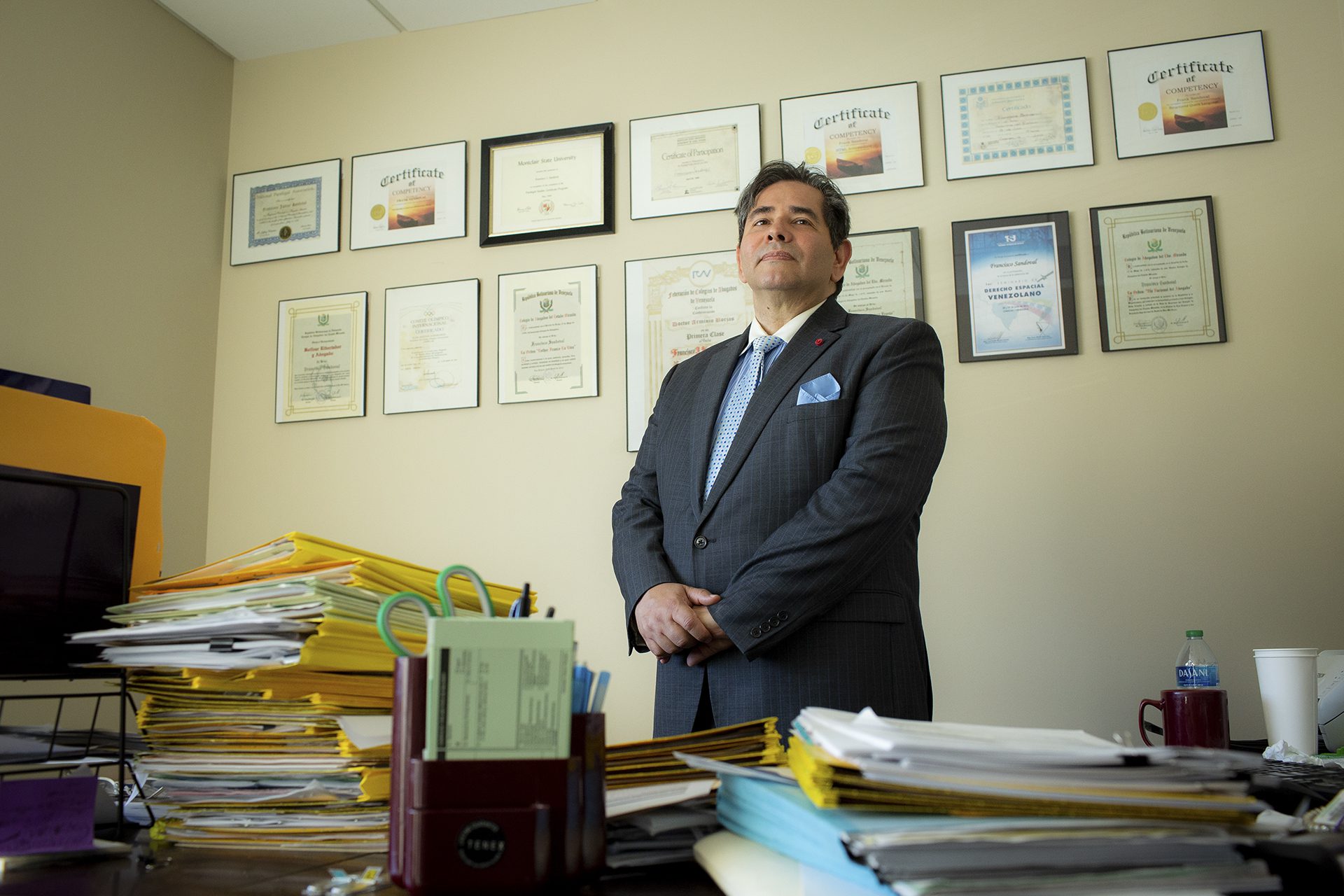 Michelle Kanaar/Revista sin fronteras
Michelle Kanaar/Revista sin fronterasLa llegada a Chicago de más de dos mil inmigrantes procedentes de Texas está agravando la necesidad de abogados que lleven casos de asilo.
Frank Sandoval ha pasado las últimas cuatro semanas trabajando como voluntario para ayudar a los migrantes que llegan en autobuses desde Texas a encontrar refugio y recursos básicos, como comida y abrigos, en la zona de Chicago.
Como inmigrante que es, se siente identificado con muchos de los más de dos mil inmigrantes. inmigrantes que han llegado a Chicago desde el 31 de agosto. Al igual que Sandoval, la mayoría de las personas trasladadas en autobús a Chicago han huido de Venezuela y buscan asilo en Estados Unidos.
¿Quieres recibir historias como esta en tu correo cada semana?
Suscríbase a nuestro boletín gratuito.

Como Sandoval es bilingüe, ha podido ayudar con la documentación de entrada y prestar servicios de traducción en los refugios como voluntario de la organización sin ánimo de lucro Illinois Access to Justice. También sirve comida a los inmigrantes, intenta ayudarles a conseguir permisos de trabajo y dedica horas de su tiempo a hablar con ellos sobre su situación actual y los problemas legales a los que se enfrentan. Como abogado que se dedica a ayudar a los demás, se alegra de poder ayudar a los inmigrantes.
Pero afirma que la experiencia le está removiendo emociones profundas de su propio y difícil viaje a Estados Unidos hace cuatro años. Recuerda lo mucho que le dolió estar lejos de su familia y lo asustado que estaba por no poder quedarse en su nuevo hogar.
"Estoy reviviendo todo", dijo Sandoval. "Todo vuelve a surgir".
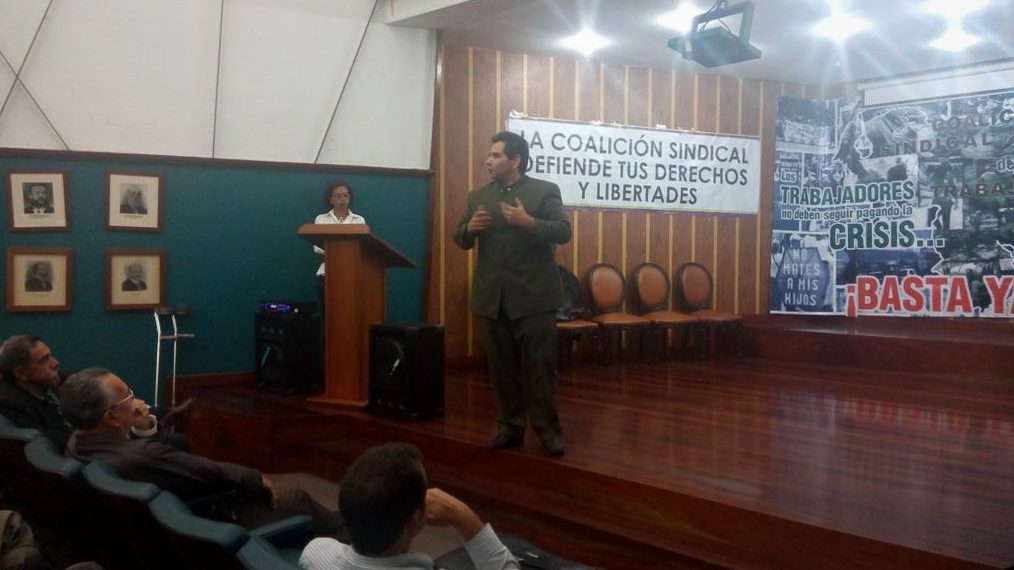
De vuelta en Venezuela, Sandoval era un abogado especializado en derecho fiscal y laboral. Pero cuando su vida se vio amenazada por su afiliación política, llegó a Estados Unidos en 2018 para pedir asilo.
Desde entonces, el proceso de asilo no ha hecho más que complicarse debido a escasez de abogados de inmigración en EE.UU. que lleven casos de asiloun problema que lleva años agravándose. Los defensores de los inmigrantes con los que habló Borderless dicen que la necesidad de abogados de inmigración, en particular los que manejan casos de asilo, está en su punto más alto. El agotamiento, los años de políticas de inmigración cambiantes bajo la presidencia de Donald Trump y la afluencia de solicitantes de asilo y migrantes de países como Afganistán, Ucrania y Venezuela en los últimos años solo se han sumado a la creciente crisis. Y con lo que está en juego para los solicitantes de asilo que han huido de condiciones peligrosas y necesitan representación en el tribunal de inmigración a menudo siendo una cuestión de vida o muerte, los defensores de los inmigrantes en Chicago están buscando nuevas soluciones.
Un sistema judicial sobrecargado
Al igual que muchas industrias, los abogados de inmigración lucharon contra la pandemia. Muchos han renunciado debido en parte al estrés del trabajo, las políticas desafiantes puestas en marcha bajo la administración Trump y una creciente acumulación de casos. Representar a los solicitantes de asilo, en particular, ofrece sus propias dificultades, incluidos los clientes que pueden pagar poco o nada por la representación.
"Hay una escasez de abogados de inmigración que acepten casos de asilo, punto", dijo KiKi Mosley, abogada de inmigración desde hace doce años y tesorera de la sección de Chicago de la Asociación de Abogados de Inmigración. Asociación Americana de Abogados de Inmigración. "Al asumir casos de asilados y refugiados, los abogados de inmigración no buscan obtener beneficios, pero llegas a un punto en el que es difícil pagar las facturas de tu consulta".
Como gran ciudad que atrae a inmigrantes, Chicago en concreto ha tenido dificultades para soportar la reciente afluencia de solicitantes de asilo. Después de lidiar con los recortes bajo la administración Trump y luego la pandemia de COVID-19, los recursos de las organizaciones de atención a inmigrantes ya estaban bajo presión antes de que la guerra de Ucrania y la retirada de Estados Unidos de Afganistán y la posterior toma del poder por los talibanes enviaran a Chicago a miles de refugiados y solicitantes de asilo. La reciente llegada de inmigrantes procedentes de Texas no ha hecho sino aumentar la presión sobre los recursos de las organizaciones, incluidos los servicios y la representación jurídicos.
”"Hay personas que llevan años languideciendo, esperando una entrevista [de asilo], que no tienen ni idea de cuándo van a ser entrevistadas realmente".
KiKi Mosleyde la sección de Chicago de la Asociación Americana de Abogados de Inmigración
"Hemos asistido a una crisis humanitaria tras otra", afirma Jane Lombardi, directora de asociaciones para la justicia de los inmigrantes de la Oficina del Alto Comisionado de las Naciones Unidas para los Refugiados. The Resurrection Projectuna organización sin ánimo de lucro que ofrece vivienda asequible, educación financiera y servicios jurídicos y de defensa de los inmigrantes en Chicago. "Con tanta gente necesitando asistencia de asilo, realmente está poniendo a prueba a nuestros proveedores para satisfacer las necesidades en un corto plazo de tiempo".
Con muy poca estructura y plazos, los expedientes de asilo duran una media de cuatro años y medio. uno de cada tres Las solicitudes de asilo presentadas desde octubre de 2000 siguen pendientes.
"Hay personas que llevan años languideciendo, esperando una entrevista [de asilo], que no tienen ni idea de cuándo van a ser entrevistadas realmente", dijo Mosley.
Hay dos tipos de casos de asilo: afirmativo y defensivo. Los casos de asilo afirmativo requieren que la persona esté físicamente presente en Estados Unidos y tema por su seguridad en su país de origen. Los solicitantes de asilo afirmativo tienen un año para presentar la solicitud.
El asilo defensivo se produce cuando se ha iniciado un procedimiento de deportación y una persona solicita asilo para evitar su expulsión de EE.UU. Estos casos se presentan en defensa contra el deseo del Departamento de Seguridad Nacional de expulsar a esa persona de EE.UU. La mayoría de los solicitantes de asilo que están siendo trasladados en autobús a Chicago desde Texas se enfrentan a casos de asilo defensivo, dicen los defensores de los inmigrantes.
Dado que existe una amenaza más inminente en los casos de asilo defensivo, las organizaciones locales como el Centro Nacional de Justicia para los Inmigrantes suelen destinar más recursos a asesorar a los solicitantes de asilo defensivo.
"Con la escasez, estamos tratando de averiguar cuál es el lugar donde podemos prevenir la amenaza más aguda de daño, y eso es en un contexto defensivo", dijo Lisa Koop, Directora Nacional de Servicios Jurídicos del NIJC.
En ambos tipos de casos de asilo, las personas no tienen garantizada la representación legal. Los solicitantes de asilo deben recurrir a un escaso número de servicios pro bono, o pagar la factura de un abogado de inmigración, que oscila entre 1.000 y 1.000 euros. De $1.000 a más de $10.000dependiendo del tipo de caso. Incluso si alguien puede permitirse los honorarios de un abogado, encontrar representación legal a tiempo para su audiencia de asilo puede ser difícil.
"Hay situaciones en las que las personas son empujadas a través del sistema muy rápidamente. Y al no tener derecho a un abogado de oficio, pueden verse abocados a un juicio de asilo antes de tener la oportunidad de localizar a un abogado, y eso puede ser realmente perjudicial", dijo Koop.
Además, los casos de asilo exigen un trabajo exhaustivo y suelen implicar historias de tremendos traumas que los abogados tienen que soportar. El agotamiento es generalizado entre los abogados, y la acumulación de casos pendientes no ayuda a un sistema ya desbordado. Es un sistema que Sandoval conoce muy bien, como abogado y como persona que ha pasado por el proceso de asilo.
El viaje de Sandoval hacia la libertad
Sandoval llegó a Estados Unidos procedente de Venezuela en los años 90 para estudiar inglés y paralegal. Esperaba que los conocimientos adquiridos le fueran útiles y que ser bilingüe le permitiera prestar asistencia jurídica a más personas en su país.
Pero su regreso a Venezuela en 2000 le trajo problemas económicos, penurias y, en última instancia, puso su vida en peligro.
Una vez en casa, Sandoval reanudó su vida profesional como abogado y se convirtió en profesor de dos universidades locales. Cuando enfermó en 2011, se enfrentó a una creciente presión financiera y quiso encontrar un trabajo con más estabilidad. A través de un amigo, consiguió un empleo en el gobierno, pero tuvo que ocultar su afiliación activa a un partido antigubernamental.
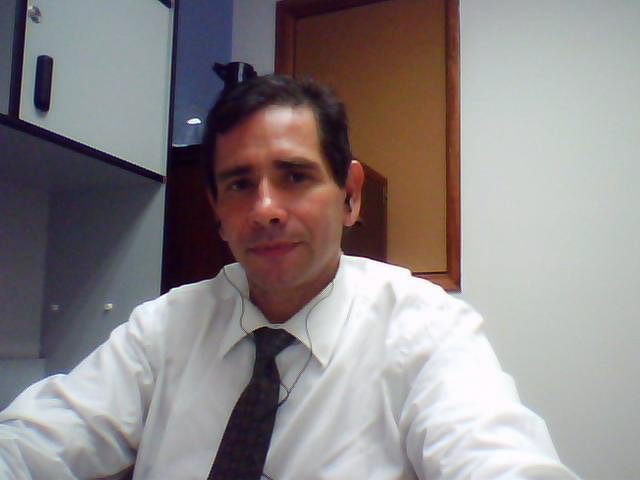
Las Gobierno venezolano del entonces presidente Hugo Chávez era ampliamente conocido por su discriminación contra los opositores políticos y los críticos. Despidieron a opositores políticos de organismos estatales, negaron a los ciudadanos el acceso a programas sociales y discriminaron a medios de comunicación y sindicatos críticos. Los investigadores de las Naciones Unidas descubrieron que Los leales a Chávez secuestraban, torturaban y mataban adversarios políticos.
Cuando se nombró una nueva dirección en el gobierno tras la jubilación de su amigo, se le pidió que dimitiera por su afiliación a un partido político. Al negarse, fue degradado. Pero siguió siendo políticamente activo. Cuando empezaron a circular imágenes suyas en manifestaciones, se le negó tratamiento médico para su debilitante enfermedad y recibió continuas llamadas y mensajes amenazándole de muerte. Ya no estaba seguro en casa. Fue entonces cuando decidió huir a Estados Unidos.
En junio de 2018, llegó a Nueva Jersey para estar con su padre y solicitó asilo. Se trasladó a Nueva York al mes siguiente, le dieron un permiso de trabajo y fue voluntario de Legal Services NYC, pero tuvo dificultades para encontrar trabajo en la ciudad. Buscó a los abogados de Legal Services NYC para que le ayudaran con su caso de asilo, pero como técnicamente trabajaba para ellos, le dijeron que no podían representarlo.
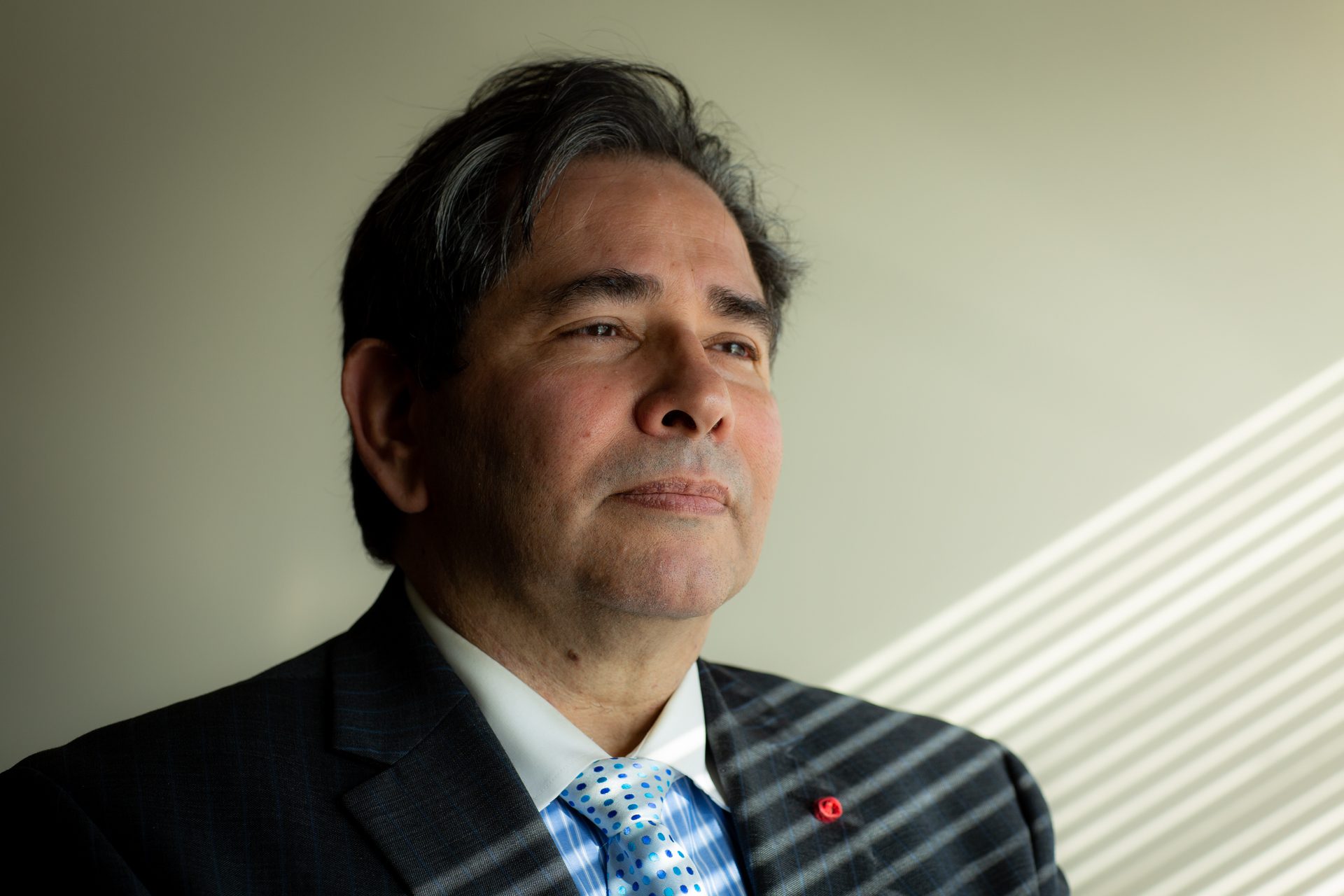
Al año siguiente se trasladó a Illinois para trabajar como asociado jurídico. Sin embargo, incluso con su nuevo salario, no podía permitirse un abogado privado para su caso de asilo, que le dijeron que le costaría $8.000 dólares. Para empeorar las cosas, se enteró de que ganaba demasiado dinero como para tener derecho a un abogado gratuito, a pesar de que sólo ganaba $20 la hora.
Sandoval decidió finalmente que iba a representarse a sí mismo. Asistió a un curso de formación jurídica sobre asilo, vio vídeos sobre el proceso de audiencias de inmigración, estudió las normas del tribunal, consultó a quienes habían pasado por el proceso y reunió las pruebas necesarias para su caso.
Tras un penoso proceso que duró cuatro años, Sandoval obtuvo finalmente asilo.
"No sólo sentí alivio, sino que me sentí segura", dijo Sandoval. "Sentí que voy a seguir viviendo".
Más información
Pero los estudios de inglés de Sandoval y sus conocimientos y experiencia jurídicos hacen de él un caso raro entre los solicitantes de asilo.
Entre octubre de 2000 y septiembre de 2021, de los 1,3 millones de casos de asilo finalizados de los casi 2 millones presentados, sólo se concedió asilo a 46%.
Y a los que carecen de representación les suele ir mucho peor.
La falta de conocimientos de inglés, de conocimientos jurídicos y de comprensión general de todo lo que se requiere en un caso de asilo crea enormes barreras para quienes se representan a sí mismos, conocidos como solicitantes de asilo "pro se", dice Lombardi.
Sólo 1 de cada 10 personas gana su caso de asilo cuando no tienen representación legal. Y a medida que continúa la escasez de abogados para inmigrantes, cada vez más solicitantes de asilo que esperan estar a salvo en Estados Unidos se enfrentan a esa realidad.
Recursos de reestructuración
La necesidad de abogados ha hecho que los bufetes de abogados de inmigración y las organizaciones que ayudan en la representación de asilo en Chicago se replanteen cómo están distribuyendo sus recursos.
"Intentamos responder a la escasez de abogados equipando a la gente para que se represente a sí misma, lo cual no es lo ideal, pero hay pocas opciones buenas", dijo Koop, del NIJC. La organización sin ánimo de lucro ha estado organizando clínicas de asilo afirmativo pro se, en colaboración con otros servicios jurídicos y organizaciones, para ayudar a los solicitantes de asilo a comprender los entresijos del sistema judicial y darles más posibilidades de ganar su caso. Les explican cómo solicitar asilo, cómo preparar los formularios y qué esperar de la entrevista.
También han creado un Línea directa del Tribunal de Inmigración donde los inmigrantes que solicitan asilo defensivo pueden recibir información jurídica gratuita, incluida una visión general del proceso de audiencia ante el tribunal de inmigración, las formas de alivio disponibles y referencias a representación legal.
”"Intentamos responder a la escasez de abogados equipando a la gente para que se represente a sí misma, lo cual no es lo ideal, pero hay pocas opciones buenas".
Lisa KoopDirectora Nacional de Servicios Jurídicos del Centro Nacional de Justicia para los Inmigrantes
"Si podemos formalizar parte del intercambio de información y crear cosas como vídeos o materiales escritos que puedan transmitirse a todo el mundo, liberaremos a algunos de nuestros abogados para que puedan reunirse cara a cara con la gente y responder a sus preguntas y ayudarles realmente a que sus historias se cuenten de la manera más eficaz posible", dijo Elizabeth Rompf Bruen, abogada de inmigración y presidenta de la sección de Chicago de AILA.
AILA también está reclutando estudiantes de derecho y abogados voluntarios para ayudar con la admisión, la interpretación y la selección legal para ayudar a aliviar la escasez de asistencia.
Esta rápida movilización entre diversas organizaciones al servicio de los inmigrantes y grupos jurídicos ha sido decisiva en el último año, dijo Rompf Bruen.
"Ha sido estupendo ver la cooperación entre representantes del gobierno, varias organizaciones sin ánimo de lucro y abogados privados que responden a la necesidad de servicios jurídicos", dijo Rompf Bruen. "Hemos visto a estas comunidades receptoras dar un paso al frente y formar un pueblo en torno a nuestros vecinos más recientes para que puedan recibir seguridad y apoyo".
Retos persistentes
Aunque la ciudad de Chicago ha hecho todo lo posible por responder a las necesidades de los solicitantes de asilo recién llegados, aún quedan muchos problemas por resolver.
Por un lado, muchos de los migrantes tienen que comparecer ante los tribunales en localidades situadas a miles de kilómetros de distancia. Y aunque Pritzker declara el estado de emergencia se espera que ayude a agilizar el alojamiento, el transporte y el cuidado de estas personas, los recursos siguen siendo necesarios de forma continua.
Koop afirma que también es importante que se asignen recursos para contribuir a la capacitación de los servicios jurídicos, como la tutoría de posibles abogados y la creación de una cantera de defensores, sobre todo de aquellos que aporten competencia cultural y hablen otras lenguas.
Del mismo modo, Lombardi afirmó que es necesaria una financiación sostenida para poder pagar al personal de las organizaciones sin ánimo de lucro un salario competitivo. Importante inversión estatal en organizaciones sin ánimo de lucro que prestan servicios jurídicos en materia de inmigración no han empezado hasta hace pocos años, lo que significa que las organizaciones aún están tratando de aumentar su experiencia y capacidad para asumir casos de asilo.
Para ayudar a ampliar la comunidad de abogados especializados en inmigración, se han puesto en marcha varios programas destinados a derribar las barreras que impiden el acceso a los estudios de Derecho a quienes les resultan prohibitivos.
El Proyecto Resurrección acaba de lanzar una beca llamada Beca Colibri para la acreditación del DOJ - una beca profesional pionera para formar a personas que deseen obtener la acreditación del DOJ. La beca dura un año y los 23 becarios son inmigrantes o hijos de inmigrantes.
Además, el Programa de Reconocimiento y Acreditación del Departamento de Justicia permite a las organizaciones sin ánimo de lucro convertirse en organizaciones reconocidas y que su personal no abogado actúe como representante legal ante los tribunales de inmigración.
En última instancia, los defensores legales como Frank Sandoval y los inmigrantes solicitantes de asilo quieren un proceso más formalizado y expeditivo, con recursos adecuados para contar las historias de los millones de personas que solicitan asilo.
"Queremos que la administración tramite estos casos con mayor rapidez", dijo Sandoval. "Venimos aquí porque buscamos un lugar seguro para vivir, pero no hay un alivio inmediato. Te quedas atascado en los procedimientos de inmigración durante años".
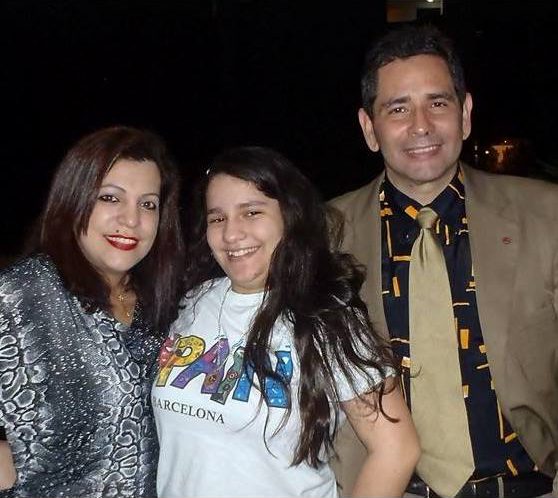
Varias veces al día, Sandoval se ve interrumpido en su montaña de casos de inmigración por el sonido de las campanas del puente. Desde la ventana de su despacho, en el Centro Comunitario Español de Joliet, puede ver el puente verde agua que cruza el río Des Plaines. La tranquila escena de la subida del puente es un bienvenido descanso de su difícil trabajo en defensa de los inmigrantes. Pero también es un recordatorio de lo lejos que ha llegado desde que huyó de su hogar en Venezuela.
Sandoval tardó casi cuatro años en concluir su caso de asilo en Estados Unidos. Ahora solicita asilo en nombre de su mujer y su hija, que siguen viviendo en Venezuela. Sandoval presentó toda la documentación necesaria y solicitó un proceso acelerado a principios de abril de 2022, pero aún no ha recibido respuesta del gobierno.
"Llevamos cuatro años separados y no sé cuánto van a tardar en venir para acá", dijo Sandoval. "Esto es una locura".
Dice que aún tiene pesadillas sobre su vida en Venezuela, pero tiene esperanzas de que él y su familia se reúnan pronto de forma segura aquí.
Nota del editor: Una versión anterior de este artículo atribuía incorrectamente una cita a KiKi Mosley. Se ha actualizado para reflejar que la declaración fue hecha por Elizabeth Rompf Bruen.

Da poder a las voces de los inmigrantes
Nuestro trabajo es posible gracias a las donaciones de personas como usted. Apoye la información de alta calidad haciendo una donación deducible de impuestos hoy mismo.

